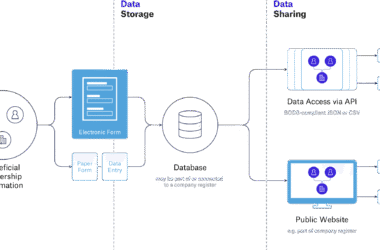Table of Contents Show
The UK sees financial crime growing rapidly which creates escalating burdens for institutions as well as regulatory bodies and business operations. Traditional prevention methods cannot keep pace as fraud represents more than 40% of reported crimes in England and Wales and inflicts a £6.8 billion financial burden on the UK annually.
Financial institutions in the UK spend about £34.2 billion annually on fraud prevention yet their disjointed systems and old processes remain exploitable weaknesses for criminals.
A fresh solution is emerging that promises to transform the verification of businesses and prevent financial crimes more effectively.
Enter: The Digital Company ID Framework
The Digital Company ID initiative represents a foundational move to establish a unified corporate identity system which CFIT leads through cooperation with regulators, banks, and tech providers.
This initiative serves as a comprehensive framework which delivers optimized verification processes alongside lower compliance expenses and enhanced fraud defense mechanisms throughout the UK financial sector.
Why a Digital Company ID is Urgently Needed
The urgent need for Digital Company ID arises from the current vulnerabilities in financial systems which criminals exploit. Criminal networks find opportunities in the inconsistent ways financial institutions manage and distribute risk information. Fraudsters bypass one bank’s alert system by targeting another bank with less effective detection capabilities. Small and medium-sized enterprises (SMEs) face delays in getting banking services and financing because they endure repetitive KYC processes.
Digital Company ID changes this dynamic by:
- Assigning businesses a single, standardized digital identity
- Enabling secure data sharing across institutions
- Reducing onboarding friction
- Enhancing regulatory compliance and fraud detection
It’s already gaining traction: The UK government investigates how tax filings and annual returns can be integrated with Companies House.
How It Works
The framework results from collaboration with over 70 experts from financial services, government and academic fields.
- Streamline onboarding across banking and fintech
- Instant business identity verification helps detect fraud more quickly
- This framework ensures compliance with legislative requirements such as the Economic Crime and Corporate Transparency Act (ECCTA).
- Make data-sharing possible between regulators and institutions while maintaining data privacy.
Collaboration is Key
The achievement of success requires synchronized efforts across different sectors.
- The integration of the Digital Company ID by banks into client lifecycle management will enhance fraud detection capabilities while speeding up the onboarding process.
- Updated regulatory frameworks alongside sandbox environments should be established by regulators to support innovation.
- Data providers and fintech companies need to maintain their efforts towards developing secure digital identity solutions which adhere to existing privacy regulations.
- Organizations such as FMSB play an essential role in establishing standards that govern interoperability and organizational governance.
From Concept to Commercial Value
The Digital Company ID initiative demonstrates a natural connection to Corporate Digital Identity (CDI) which Encompass Corporation popularized. The integration of these solutions aids in speeding up business identity verification while improving security alongside automation processes.
Research by Chartis and Encompass shows:
- CDI implementation can eliminate as much as 59% of expenses related to manual onboarding tasks.
- Companies can secure 21% total cost savings during the first year.
- Operational efficiency and commercial uplift enable 57% cost reductions.
- CFIT’s proof of concept suggests that customer retention rates may increase by 33%.
Securing the Future of UK Finance
Through its fight against financial crime the UK can establish a leadership role while maintaining its status as a global fintech leader. A Digital Company ID model that follows standardization principles creates a seamless, protected environment where all participants can trust the system.
- Businesses verify once, use everywhere
- Banks onboard faster and safer
- Through interoperability and compliance alongside transparency systems make it difficult for fraudsters to succeed.
But progress demands action. To make progress in the financial sector both fintech organizations and regulatory bodies need to work together to adopt CDI systems while supporting innovation and strengthening their regulatory frameworks.
The UK can establish global leadership in digital business verification through CFIT’s guidance which enhances trust and compliance while promoting innovation in the financial sector.




